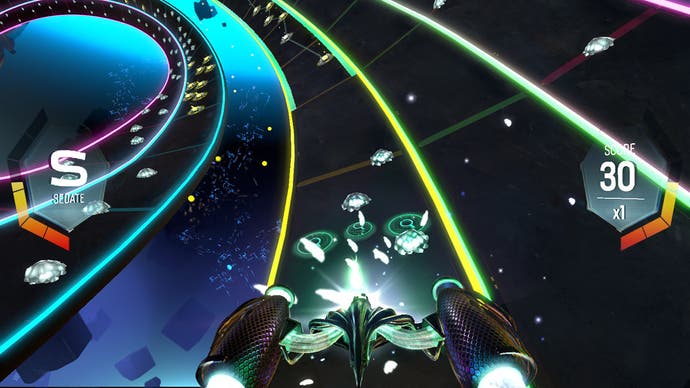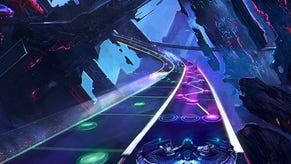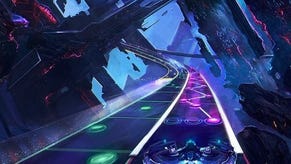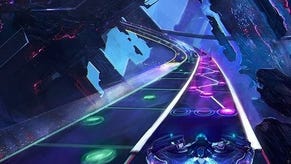Amplitude review
Rhythm abstraction.
Guitar Hero was where the music video game went to find an audience and it was where the music video game went to make money (for a while, at least). While Sony's PaRappa the Rapper had a certain Sesame Street hip-hop chic and Beatmania appealed to the Japanese arcade showboater, it was only in Harmonix's take on rock pantomime that the emerging genre found a stadium-sized crowd. The game, which soon inspired a generation of copycats, brought the showmanship of the concert into the living room.
Players, with a Fisher Price plastic guitar controller dangling over their midriff, could pose in front of onlookers, who, in turn, would belt along to the classics. Play became performance. The recipe proved powerful. Guitar Hero took music games into the mainstream, and made Harmonix, for a time, rich. Nevertheless, there were many who mourned this change in direction, one that took music games away from the studio's earliest work, 2001's Frequency and its magnificent follow-up, Amplitude.
Why? Because, in this pair of games you were responsible, not only for proving the guitar lines in a piece of music but every other instrument too. You raced down a neon-lit musical stave, tapping buttons in time with the pulse. Then you would snap between the drum lane into the keyboard lane, and from there onto the bass track, the vocals and every other kind of rhythmic fizz and whir. With each transfer you'd trigger samples, building the song up to its full orchestration before working to keep it all rolling along at full volume.
Like the games that would follow, Amplitude required skill and dexterity. Unlike most of the games that would follow, it allowed for creative flair. There is a compositional element to play. You might choose to trigger the vocals, then the bass-line, then keyboards in a particular track. Or you might start with the drums before moving to the timpani. In Guitar Hero you are playing Simon Says. In Amplitude, every track is a musical performance: your choices create a unique mix. Here, then, is a game which casts you not as a mere player in a cover band, but as an artist in your own right.
All of this remains true in 2016's Amplitude, a reboot, if you can call it that, of the 2003 game with which it shares a name. Funded on Kickstarter after Harmonix was unable to convince a publisher to fund the game it embraces the fact that it is a video game.
You control a spaceship as it rides along sets of neon rollercoaster rails, described in hot pinks, pulsing blues and high-vis yellows, each one snaking through abstract space. Each of the six or so lanes is studded with beat markers that signify which of the three buttons on the controller you must strike at the precise moment your ship passes over them, in time with the music. Complete a segment without missing a beat and the lane fills in before you, automatically taking up the rhythm of the music channel for a short while, leaving you free to move to a different instrument lane. In this way you skirt back and forth across the screen, while travelling forwards at the track's unwavering BPM rate.
Often you'll need to simultaneously sight-read the end of the lane on which you're currently travelling as well as that of its neighbour, in order to make a traversal without dropping the rhythm. Manage to do so and your score combo is upheld. Amplitude is in this way (and more than any other Harmonix project) a score attack game. Your position on the leaderboards is reported for each track on the song select screen and you're also given an overall position for all of your high scores combined as it relates to every other player in the world.

The score system is disarmingly simple. You earn one point for each note you successfully hit. Manage to sustain an unbroken chain and you can multiply this up to a maximum of four points per note. You must then choose which difficulty level best suits your ambition. While the theoretical maximum score is highest on the most severe difficulty (where there is the largest number of notes on offer), a shrewd player may choose to lower the difficulty knowing that they're more likely to be able to maintain the quadrupling multiplier during the course of the track.
Enough of the technicalities: none of them matter much in the moment, as you wind through time and space, twitching along to a euphoric soundtrack. Amplitude has hypnotic effects. In time the gap closes between your will and action, your mind and fingers. There's no time to think about what your fingers are doing. Like a concert pianist, the flurry of marks turn frictionless into movement and accompanying sound. Concentration narrows. The unfamiliar, mostly instrumental soundtrack elicits this fugue state. A light dusting of storyline around the stages highlights the focusing effects of the game: you are supposedly travelling through the neural pathways of a comatose patient, attempting to revive them from a synaesthetic slumber.
The music video game's trajectory has been as chaotic as that of one of the many rock stars who have lent their music to the genre: the underground buzz, the meteoric rise, the sell-out tour, the legal battles, the dramatic fall and, finally, the persistent attempts at a comeback. 2016's Amplitude is not a part of this clichéd narrative. It offers, instead, a glimpse of an alternative track, where the music video game was content to play dingy clubs, where it didn't care too much about finding a life-changing size audience, but whose fans cared enough to make sure that it would never have to retire.
















